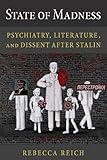State of Madness : Psychiatry, Literature, and Dissent After Stalin / Rebecca Reich.
Material type: TextSeries: NIU Series in Slavic, East European, and Eurasian StudiesPublisher: Ithaca, NY : Cornell University Press, [2020]Copyright date: ©2018Description: 1 online resource (283 p.) : 2 illustrationsContent type:
TextSeries: NIU Series in Slavic, East European, and Eurasian StudiesPublisher: Ithaca, NY : Cornell University Press, [2020]Copyright date: ©2018Description: 1 online resource (283 p.) : 2 illustrationsContent type: - 9781501757600
- Dissenters -- Soviet Union
- Involuntary treatment -- Soviet Union
- Literature and mental illness -- Soviet Union
- Mental illness -- Soviet Union
- Psychiatry -- Political aspects -- Soviet Union
- Psychiatry -- Soviet Union -- History
- History
- Psychology & Psychiatry
- Soviet & East European History
- HISTORY / Russia & the Former Soviet Union
- Joseph Brodsky, Andrei Siniavskii, Venedikt Erofeev, Hans Christian Andersen, Emporer's New Clothes, psychiatry and literature, Soviet psychiatrists, unsanctioned prose, unsanctioned poetry
- 362.2/04220947 23
- PN56.M45 R457 2018
- online - DeGruyter
| Item type | Current library | Call number | URL | Status | Notes | Barcode | |
|---|---|---|---|---|---|---|---|
 eBook
eBook
|
Biblioteca "Angelicum" Pont. Univ. S.Tommaso d'Aquino Nuvola online | online - DeGruyter (Browse shelf(Opens below)) | Online access | Not for loan (Accesso limitato) | Accesso per gli utenti autorizzati / Access for authorized users | (dgr)9781501757600 |
Browsing Biblioteca "Angelicum" Pont. Univ. S.Tommaso d'Aquino shelves, Shelving location: Nuvola online Close shelf browser (Hides shelf browser)

|

|

|

|

|

|

|
||
| online - DeGruyter Social Identity in Imperial Russia / | online - DeGruyter Socialist Churches : Radical Secularization and the Preservation of the Past in Petrograd and Leningrad, 1918–1988 / | online - DeGruyter Something That Feels Like Truth / | online - DeGruyter State of Madness : Psychiatry, Literature, and Dissent After Stalin / | online - DeGruyter Steelpan in Education : A History of the Northern Illinois University Steelband / | online - DeGruyter Swedish Chicago : The Shaping of an Immigrant Community, 1880–1920 / | online - DeGruyter Tagalog Verb Dictionary / |
Frontmatter -- Contents -- Acknowledgments -- Author’s Note -- Introduction -- CHAPTER 1 Soviet Psychiatry and the Art of Diagnosis -- CHAPTER 2 Thinking Differently: The Case of the Dissidents -- CHAPTER 3 Dialogue of Selves: The Case of Joseph Brodsky -- CHAPTER 4 Creative Madness: The Case of Andrei Siniavskii -- CHAPTER 5 Madness as Mask: The Case of Venedikt Erofeev -- CONCLUSION -- Abbreviations -- Notes -- Bibliography -- Index
restricted access online access with authorization star
http://purl.org/coar/access_right/c_16ec
What madness meant was a fiercely contested question in Soviet society. State of Madness examines the politically fraught collision between psychiatric and literary discourses in the years after Joseph Stalin's death. State psychiatrists deployed set narratives of mental illness to pathologize dissenting politics and art. Dissidents such as Aleksandr Vol'pin, Vladimir Bukovskii, and Semen Gluzman responded by highlighting a pernicious overlap between those narratives and their life stories. The state, they suggested in their own psychiatrically themed texts, had crafted an idealized view of reality that itself resembled a pathological work of art. In their unsanctioned poetry and prose, the writers Joseph Brodsky, Andrei Siniavskii, and Venedikt Erofeev similarly engaged with psychiatric discourse to probe where creativity ended and insanity began. Together, these dissenters cast themselves as psychiatrists to a sick society. By challenging psychiatry's right to declare them or what they wrote insane, dissenters exposed as a self-serving fiction the state's renewed claims to rationality and modernity in the post-Stalin years. They were, as they observed, like the child who breaks the spell of collective delusion in Hans Christian Andersen's story "The Emperor's New Clothes." In a society where normality means insisting that the naked monarch is clothed, it is the truth-teller who is pathologized. Situating literature's encounter with psychiatry at the center of a wider struggle over authority and power, this bold interdisciplinary study will appeal to literary specialists; historians of culture, science, and medicine; and scholars and students of the Soviet Union and its legacy for Russia today.
Mode of access: Internet via World Wide Web.
In English.
Description based on online resource; title from PDF title page (publisher's Web site, viewed 02. Mrz 2022)


